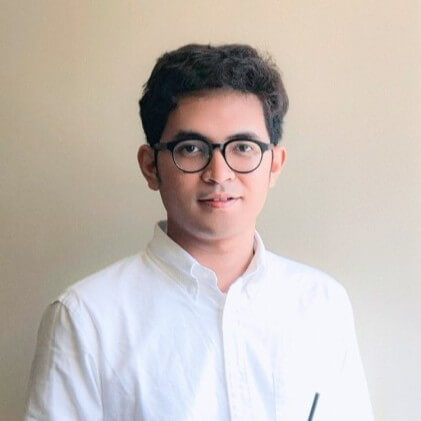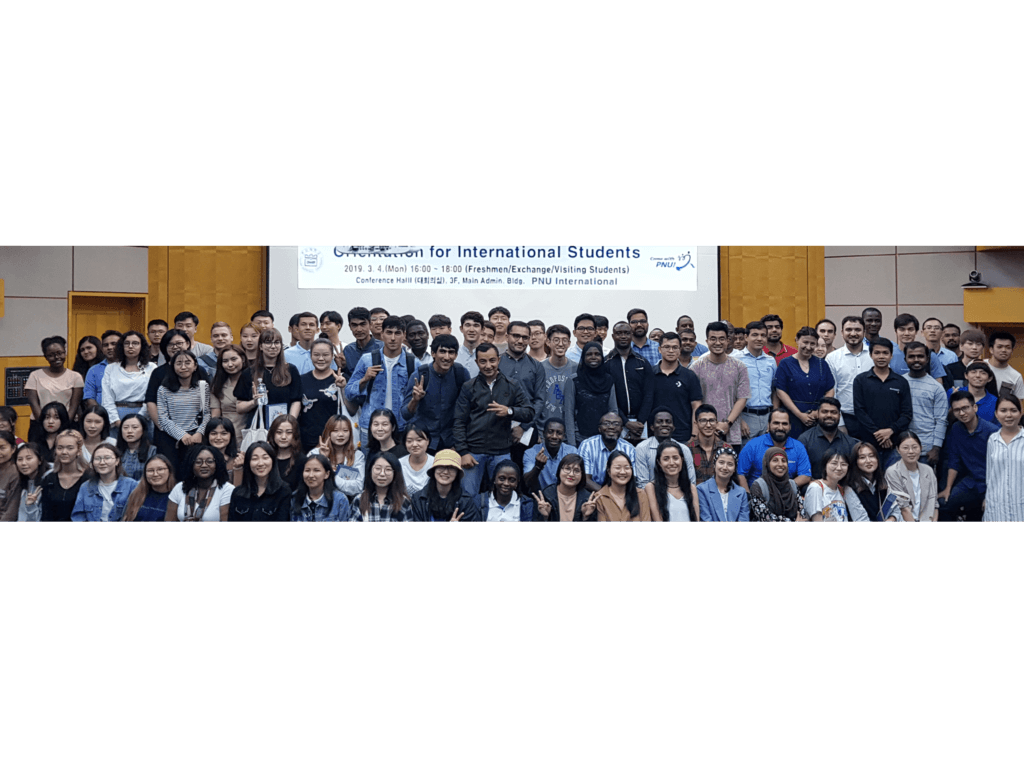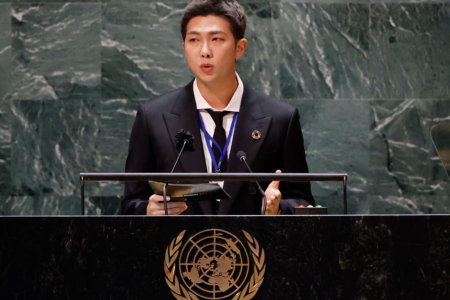
Dimas Harris Sean Keefe has always set his sights on studying abroad. He applied for what felt like countless scholarships — and even countless more rejections. That is, until he got the news he’s won what some circles tout as the most coveted financial aid of them all: a Korea scholarship.
Specifically, the prestigious fully-funded Brain Korea 21 Plus scholarship from the Korean government.
Armed with this, he set off to pursue a master’s degree at Pukyong National University and subsequently Pusan National University. A series of life-changing events followed (more below, we promise).
Today, he is a PhD candidate pursuing research with his professor at Pusan National University, and the founder of beasiswakorea.com, a platform providing critical and timely information on Korean scholarships – something he wished he could have back then.
Any scholarship application process is long and complex — which is why Keefe shares his tips and experiences at various social projects, government and youth programmes.
In this two-part series, we speak to Keefe on how the scholarship can help fellow Indonesians seeking a Korea scholarship in the first part, and his PhD journey in Korea in the second part.
This interview has been lightly edited for length and clarity.
Hi Dimas! Thank you so much for taking the time for this email interview with me. I understand that you are the founder of “Beasiswa Korea” (Indonesian for Korea Scholarship). Can you share how, when and why did you set this up?
The founding of beasiswakorea.com is closely aligned with my dream of furthering my studies when I was an undergraduate student. At that time, many people graduated quickly with high marks. Many finish their bachelor’s degree in only three and a half years, which normally only takes four years.
While others wanted to find work, I was actually looking for ways to go to the next level of education. I wanted to continue my study abroad journey so that I can experience a different learning environment.
However, I ran into several challenges in finding overseas scholarships that could accept my mediocre grades and English language skills. I searched for all scholarship information everywhere – from websites, social media, mailing lists and messenger groups.
I focused my search on Europe, Asia, and America; finally, I got a scholarship to study in Korea in 2016. While studying in Korea, to my surprise, there was a lot of scholarship information available!
It was very different from when I was still looking for scholarship information back in Indonesia. Seeing this, I took the initiative to create a platform that could provide more information and guidance to study abroad in Korea.
What do you hope Indonesian students can get from your website besides Korea scholarships?
I believe that education is a way to change someone’s life for the better. Indonesia’s level of education still needs to be improved. Therefore, I hope that beasiswakorea.com can be a bridge for all Indonesians to get a proper education. I also want to spread the message that everyone deserves a scholarship, no matter what their background is.
To answer all of that, beasiswakorea.com provides facilities and services in the form of scholarship information, scholarship guides, scholarship-hunter communities, training for admission or scholarship preparation, webinars, and education festivals. In addition, our website provides language training, document translation, and document legalisation.
I also hope that beasiswakorea.com will not only help Indonesian students but also students in other countries that need information and guidance to study abroad, especially in South Korea.
Keefe conducted a new student orientation with various students from other parts of the world, which he enjoyed tremendously.
You are the former Director of Business Incubation and Partnership of OISAA (Overseas Indonesian Students Association Alliance) and the former President of PERPIKA. Can you explain the main purpose of these organisations, and in what ways have these organisations benefitted Indonesian and Korean students?
The purpose of OISAA is to build, improve, strengthen and foster the role, quality, and relationship of Indonesian students among their fellow students, the community, and institutions for Indonesian development. OISAA’s activities include Education, Research, Human Resource Development, and Community Service.
I am also the former president of PERPIKA, the Indonesian Student Association in South Korea which is also part of OISAA. The main purpose of this organisation is to become a forum and media platform for Indonesian students who want to provide ideas and contribute to the study abroad experience in Korea.
PERPIKA is a place for Indonesian students currently in South Korea to gather, have fun, organise, and share their dreams and aspirations as well. We have collaborated on programmes that provide benefits for Indonesian citizens in Korea, Korean citizens, and even citizens of other countries in Korea such as ASEAN citizens, and those from the African continent, Europe and America among others.
Some of our programmes include job vacancy information, education and sports festivals, welfare care, the PERPIKA academy, culture immersion gatherings, conferences and so on.
I also noticed you are an SNS Specialist of @studyinkorea_niied. Can you share more about this, and is there any impact upon Beasiswa Korea and PERPIKA for Korea scholarships?
NIIED provides opportunities for foreign students to share experiences, information, and guidance about scholarships, student life in Korea, and other interesting information about studying in Korea. This programme is called NIIED SUPPORTER where we can be either an SNS Specialist or Video Specialist.
I’m lucky to be a part of the NIIED SUPPORTER as an SNS Specialist who can help beasiswakorea.com and PERPIKA. One of the benefits of joining as a NIIED SUPPORTER is that beasiswakorea.com gets information directly from the Korean government so that the information we provide is actual and accurate for anyone who wants to study abroad in Korea. In addition, PERPIKA also gets some funding to run programmes and places such as exhibition halls to conduct seminars. However, due to the pandemic, we cannot use these facilities to hold events.
That is a shame about not being able to promote due to the pandemic. We all know Korea is famous for cutting-edge technology and education standards as well. What do you think are the main reasons that more international students are interested to study there and check out Korea scholarships?
Korea is number five in the global innovation index in the world and number one in Asia. This is one of the reasons why many foreign students want to continue their studies in Korea.
Korean culture and language are other reasons why Korea is an attractive study destination. K-Pop and K-drama – which have gone global – have made even more people interested in the idea of studying in Korea.
Interestingly, South Korea provides many and various types of full scholarships for foreigners who want to study in Korea. For example, there are the GKS (Global Korea Scholarship), KOICA, HEAT, AKS, university scholarships, and many more.
What about Indonesia – why and how is studying in Korea beneficial or attractive for your fellow Indonesians in terms of Korea scholarships?
Diplomatic relations between Indonesia and Korea are very good. A lot of cooperation has been carried out by the two countries. This good relationship has a positive impact on Indonesian citizens who want to study abroad in Korea.
One example is that the scholarship quota for Indonesia can be said to be quite larger compared to other countries. In addition, many Korean companies need workers and researchers from Indonesia. This is an advantage for Indonesian citizens who graduate from South Korean universities.
These are great reasons for Indonesians to consider Korea as a study destination. Can you share with us how Indonesia’s education system differs from Korea if any, and what are the great Indonesian traits that help you and other Indonesian students succeed in Korea?
The Indonesian and Korean education systems are not that different. Indonesia and Korea have the same policy that each student has six years of elementary school, three years of middle school, and three years of high school.
However, at the diploma and bachelor’s levels, there are slight differences. Korea does not require diploma or bachelor’s students to write a thesis while that is required in Indonesia. Korean and Indonesian scoring systems are also different — that is why Korea’s maximum GPA value starts from 4.3 to 4.5 (depending on the university) while Indonesia applies a maximum GPA value of 4.
My friends and I agree that the facilities provided by Korean educational institutions are many if not better, which greatly help support our research and nurture our creativity as students. Since Indonesia spans over 17,000 islands and some 300 ethnic groups, Indonesian people are used to cultural differences which make them able to adapt more quickly to their surroundings. This skill will help Indonesians follow the new learning system and new culture, especially when they study abroad in Korea.
In addition, students who continue their postgraduate studies in Korea will be more accustomed to doing research, writing research reports and theses because these three activities have been carried out since their first university semester in Indonesia.
Indeed, these are helpful and useful for Indonesians thinking of furthering their studies in Korea! Is there anything you specifically wish to highlight about Korea’s education system for international students and your fellow countrymen?
I feel that the most significant difference between the education system in Korea and Indonesia is when we take the exams – Indonesia mostly uses multiple-choice questions whereas Korea uses more essay questions.
This essay question style, in my opinion, will be a big advantage if you study abroad in Korea. We are trained to express our ideas in a written form that is academically systematic but easy to understand. This will stimulate each student personally to “learn” instead of “study.”
That is good! As you know, the COVID-19 pandemic is still ongoing. Do you think it has greatly affected students who wish to study overseas and in Korea, and why/why not?
Like it or not, COVID-19 has an impact on foreign students who want to study in Korea. One particularly significant impact is the issuance of student visas. Prospective Indonesian students who are set to study in Korea have experienced difficulties in getting student visas to Korea issued. Other countries are experiencing the same problem.
Another difficulty is when they arrive in Korea, foreign students cannot truly experience the physical teaching and learning process where they can freely discuss and interact with each other because of the rules for maintaining a distance to reduce the spread of COVID-19. In addition, many cultural and language exchange activities are conducted online which makes the experience of studying in Korea less enjoyable for some students.
I understand – COVID-19 has had a big impact on us all. Do you have any special advice to inspire future Indonesian and international applicants with regards to Korea scholarships?
I encourage friends who want to study abroad in Korea and get scholarships to pay close attention to Korean information, guidelines, culture, and language.
There is a lot of information about studying in South Korea. You can try to search on studyinkorea.go.kr or beasiswakorea.com. It’s important to verify the information and make sure their self-profiles meet the information given in the advertisements. The university department will look at your language ability, GPA value, nationality, and many more in your self-profile.
Guidance is another main key that prospective students should not forget. All the detailed information needed by applicants is explained in the scholarship guide or admission guide. In this guide, you will find out how to write an essay, eligibility criteria, the age range, and how many scholarships you get.
Finally, you need to consider Korean culture and language as well. Not all classes have professors who teach in English. It will be a waste and challenge for future students if they do not have good Korean language skills. Therefore, make sure your chosen department and university have English classes and English-taught programmes.
In addition, I strongly encourage all students to remember their main intention to continue their studies in Korea or other countries. Studying abroad is not only about learning academically but also learning how to be independent and mature. Be determined and seek knowledge, and there will always be a way for you.
Thank you so much Mr Dimas Harris Sean Keefe for your time! Stay tuned for the second part where Keefe will share about his PhD journey in Korea.










